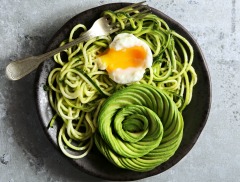Don't just meal plan... meal plan intelligently - with Meal Genius! Sign up for our free newsletter to get delicious recipes, sample meal plans and a whole lot more!
Cantaloupe
What could be better than the anticipation of cutting into a juicy, sweet, deep orange melon?
Relatives of squash, cantaloupe were named after the Italian town of Cantalupa, meaning “wolf howl”.
In addition to a powerful punch of beta-carotene and vitamin C, cantaloupes also offer a good source of potassium.
Estimated Glycemic Load=5
Antioxidant Score* (ORAC)=315
The Benefits
- Special diets: Autoimmune Paleo Diet, Elimination Diet, Gluten-Free Diet, Gluten-Free/Dairy-Free Diet, Grain-Free Diet, Low Acid Diet, Low FODMAP Diet, Low Histamine Diet, Low Oxalate Diet, Low Starch Diet, Paleo Diet (Light), Paleo Diet (Strict), Pescetarian Diet, Primal Diet, Vegetarian Diet, Whole Food
- Excellent Source of: VitaminA, VitaminC
- Good Source of: Potassium
- Preferences: No Fish, No Red Meat, No Pork, No Eggs, No Shellfish, No Gluten, No Nuts, No Seeds, No Soy, No Dairy, No Poultry, No Molds, No Citrus, No Pseudograins, No Coconut, No Nightshade, No Legumes, No Corn, No Yeast, No Peanuts, No Grains, Low Carbohydrate, Low Cholesterol, Low Fat, Low Sodium, Low Saturated Fat
Related Foods
Related Nutrients
Selecting and Storing
Choose cantaloupes that are heavy for their size, have a sweet, fruity fragrance, a thick, well-raised netting and yield slightly to pressure at the blossom end. Avoid melons with soft spots or an overly strong odor. Store unripe cantaloupes at room temperature, ripe melons in the refrigerator. Cantaloupes easily absorb other food odors so if refrigerating for more than a day or two, wrap the melon in plastic wrap.









